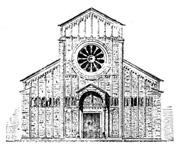
Postcards from the Ruins of a Christian Civilization
DOES THE CATHOLIC SUN STILL SHINE IN EUROPE?
Christendom is not dead, French traditionalist Catholic philosopher Chantal Delsol wrote during the COVID-19 lockdowns, but “inverted.” (Her 2021 book La Fin de Chrétienté, meaning “The End of Christendom,” is not yet translated into English.) Colonialism was once generous and admirable, and war and torture last resorts; now all three are considered Satanic. Homosexuality was banned and scorned; now it is justified and praised. Abortion is no longer criminalized but recommended. Divorce faces no obstacles. Christendom itself once inverted pagan morality: divorce, infanticide, abortion, homosexuality, and suicide fell to legislation under Christian emperors in the fourth and fifth centuries. Fervent Christian believers wore away at these abominations, which now are revived by guilty liberal Christian consciences. This new moral paradigm will defeat futile last stands waged in France against in-vitro fertilization, surrogacy, and assisted suicide. Once the protector of truth, Christianity has shriveled to an idiosyncratic opinion barely tolerated by state ethics committees.
COVID lockdowns having postponed a personal pilgrimage through Christendom that would have reunited me with old friends of five decades, I had to see for myself what was left. I had a vague plan “to cut a broad swath and shave close,” as Thoreau writes, deep through the heart of Christian infrastructure — monasteries, art, books, and families — to see how badly it might have crumbled, squinting and open to where the Catholic sun might still shine, and to report it abroad to those with ears to hear.
Iona Abbey. Scotland. May 1, 2023.
St. Columba brought Celtic Christianity to druids and Picts on this tiny island in A.D. 637, changing the winds, resuscitating the dead, foretelling events, discerning sins in absent souls, and doing penance for taking sides in a bloody Irish battle. I consult his muse on a steep hill where his writing hut overlooked the sound and the abbey, destroyed by the Vikings but rebuilt (a lot of that through the years) in the 13th and late-19th centuries. The Book of Kells was written here, after Columba.
Nunnery ruins with marvelous, latticed, mossy granite-and-shale stonework are down the road, not far from a still-functioning grammar school and baaing sheepfolds. I pray to St. Kenneth in the cemetery, and for the intentions of friends at a chapel shrine built over St. Columba’s grave. For a donation, the co-ed, ecumenical, monastic Iona Community now in residence offers rainbow ribbons for LGBTQIA+ “rights,” white ribbons for general peacemaking, purple ribbons to end domestic and sexual violence, and black ribbons for the Black Lives Matter movement. I look in vain for a crucifix and confessional.
Three hours to the mainland and another three back to Glasgow, by two ferries and two buses, Iona was less remote in the first millennium, claims a cathedral docent, because water travel was much faster than land travel. He says that Roman and Norse gods replacing the Greek may indicate an original proto-Indo-European Pantheon. We talk for an hour. Docents know off-beat details and are bored stiff: take advantage.
When I return to my hostel late, two homeless men are screaming into each other’s faces in an incomprehensible Glaswegian vitriol. The Gospel has more work to do.
You May Also Enjoy
Croatia's cardinal Stepinac faced opposition unimaginable to most prelates in the modern West. By all indications, he did not buckle.
In Poland the presumption is that truth is one, and there is only the true Church. If it's not Catholic, it's not true. The spiritual maze is simple to navigate.
Village life is a small world of community celebration, sharing of human vulnerabilities, and an always new invitation to let Jesus be the center of everything.

